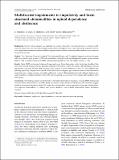Multifaceted impairments in impulsivity and brain structural abnormalities in opioid dependence and abstinence
Abstract
Background: Chronic opioid exposure, as a treatment for a variety of disorders or as drug of misuse, is common worldwide, but behavioural and brain abnormalities remain under-investigated. Only a small percentage of patients who receive methadone maintenance treatment (MMT) for previous heroin misuse eventually achieve abstinence and studies on such patients are rare. Method: The Cambridge Neuropsychological Test Automated Battery and T1 weighted magnetic resonance imaging (MRI) were used to study a cohort of 122 male individuals: a clinically stable opioid-dependent patient group receiving MMT (n = 48), an abstinent previously MMT maintained group (ABS) (n = 24) and healthy controls (n = 50). Results: Stable MMT participants deliberated longer and placed higher bets earlier in the Cambridge Gambling Task (CGT) and showed impaired strategic planning compared with healthy controls. In contrast, ABS participants showed impairment in choosing the least likely outcome, delay aversion and risk adjustment on the CGT, and exhibited non-planning impulsivity compared with controls. MMT patients had widespread grey matter reductions in the orbitomedial prefrontal cortex, caudate, putamen and globus pallidus. In contrast, ABS participants showed midbrain–thalamic grey matter reductions. A higher methadone dose at the time of scanning was associated with a smaller globus pallidus in the MMT group. Conclusions: Our findings support an interpretation of heightened impulsivity in patients receiving MMT. Widespread structural brain abnormalities in the MMT group and reduced brain structural abnormality with abstinence suggest benefit of cessation of methadone intake. We suggest that a longitudinal study is required to determine whether abstinence improves abnormalities, or patients who achieve abstinence have reduced abnormalities before methadone cessation.
Citation
Tolomeo , S , Gray , S , Matthews , K , Steele , J D & Baldacchino , A 2016 , ' Multifaceted impairments in impulsivity and brain structural abnormalities in opioid dependence and abstinence ' , Psychological Medicine , vol. 46 , no. 13 , pp. 2841-2853 . https://doi.org/10.1017/S0033291716001513
Publication
Psychological Medicine
Status
Peer reviewed
ISSN
0033-2917Type
Journal article
Description
This study was part funded by an unrestricted educational grant provided by Schering-Plough, a grant by an anonymous trust and the Scottish Mental Health Research Network.Collections
Items in the St Andrews Research Repository are protected by copyright, with all rights reserved, unless otherwise indicated.

